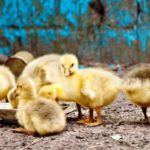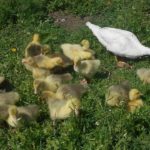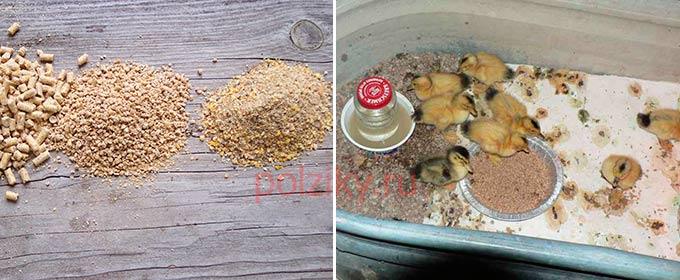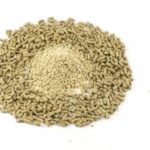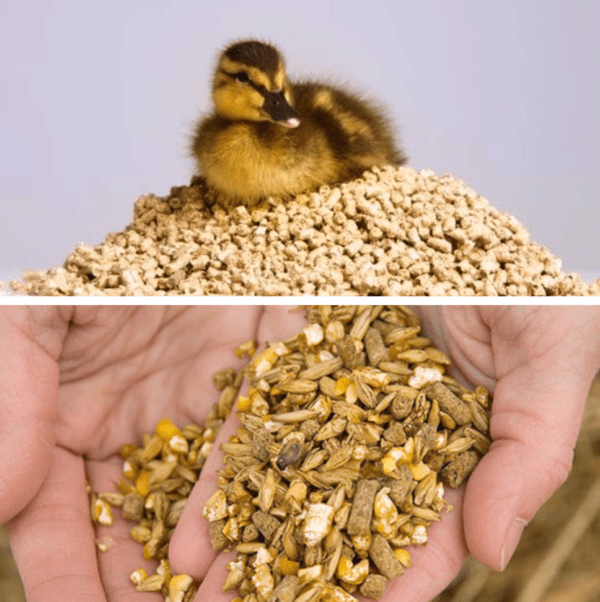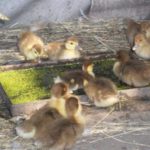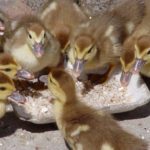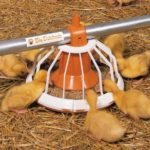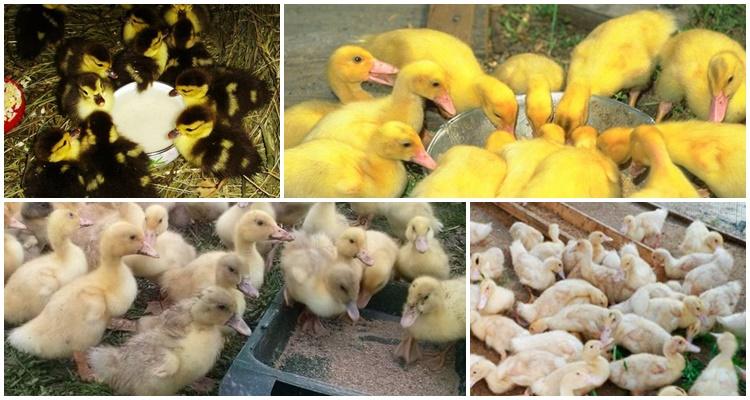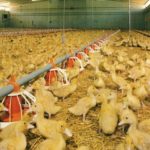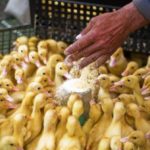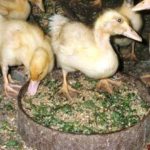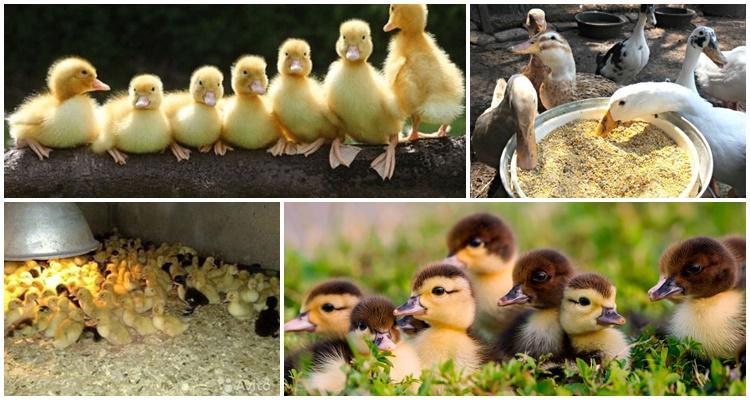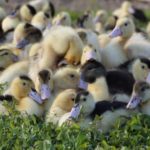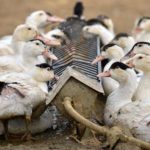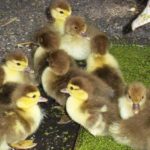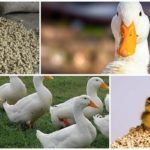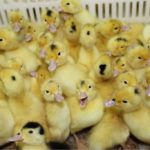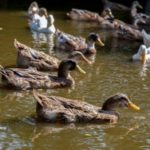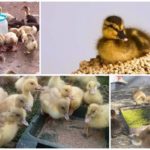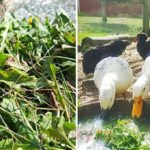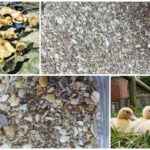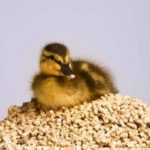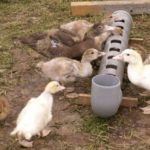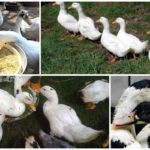The productivity of ducks depends on the nutritional value and balance of the diet. The first complementary feeding and nutrition in the first week affect the subsequent functioning of digestion. To build strong immunity monthly ducklings should receive vitamins A, B, D and E. The basis of their diet is wet mixtures. It will be useful for novice poultry farmers to know what components must be included in them and what should not be fed to ducklings.
- Types of feed for ducklings
- Cereals
- Juicy feed
- Animal products
- Mineral and vitamin supplements
- Basic feeding rules
- Diet planning
- For newborn ducklings
- For daily allowance
- For weekly
- Two weeks
- Three weeks
- Menstruation
- After a month
- Seasonal features
- Summer period
- Winter period
- Features of feeding birds for meat
- What not to feed ducks
- Consequences of poor feeding
Types of feed for ducklings
The main diet of ducks consists of plants, cereals, animal and fish components, as well as fermented milk products. Additionally, birds are given cake, boiled vegetables, yeast, and beans. The diet of ducklings of different ages includes the same components, which are divided into four groups.
Cereals
Cereals include crushed grains:
- barley;
- wheat;
- oats;
- corn.
Whole grains are given only to adult birds. Feeding ducklings begins with wheat or corn grits, and chaff is gradually introduced into the diet. Cereals contain plant protein, which is essential for weight gain.
Juicy feed
This group includes fresh herbs and vegetables:
- scalded nettle leaves;
- dandelion leaves;
- knotweed;
- yarrow;
- duckweed;
- potato;
- pumpkin;
- swede;
- carrot.
Ducklings are given kelp and soybean meal. Chicks get the following nutrients from greens and vegetables:
- vitamins B, PP, E, C, A;
- amino acids;
- potassium;
- magnesium;
- iron.
The nutritional value of duckweed is equal to that of cereals. River grass, like sea kelp, contains iodine, phosphorus, calcium and B vitamins.
Animal products
In addition to vegetable protein, ducks need animal protein. Its need is met by adding beef and fish bone flour to the diet. Ducklings are also given the following animal products:
- scrap meat - made from the carcasses of cattle that have suffered from non-infectious diseases, added to cereals for young animals in crushed form, but not more than fifteen percent of the total diet;
- meat meal - made from scraps of meat, embryos, intestines, added to the feed of ten-day-old ducklings;
- fishmeal - consists of fish waste, used in the preparation of broth for wet mash;
- Graxa is a product of melting fat from cod liver; when fresh, it is useful for ducklings from the 10th day of life; it comes in the form of flour.
The group also includes skim milk and cottage cheese. Ducklings receive protein, phosphorus, vitamin B, fat and calcium from animal products.
Mineral and vitamin supplements
Natural calcium supplements include:
- chalk - necessary for normal skeletal development;
- shells - help digestion.
Ducklings get their vitamins from greens and vegetables. But additional premixes are also added to the feed:
- “Solnyshko” is a vitamin concentrate containing all the necessary microelements; from the 10th day, ducklings are given 4 grams of the supplement;
- “Rich” - intended for chicks from the first days of life, in addition to vitamins, contains antioxidants;
- “Siberian Compound” - mineral concentrate is added to the feed of young animals, no more than one percent of the total weight of the portion.
Chalk and shells are constantly present in the diet of ducks. Vitamin premixes are added to prevent seasonal vitamin deficiency or digestive disorders in ducklings. Supplements that stimulate weight gain are also used, for example, “Ivan Ivanovich” with selenium, folic acid and a high proportion of iodine.
Basic feeding rules
Principles of feeding ducklings:
- for the normal development of birds, use components of all groups;
- pour chalk and shells into separate dishes;
- chop fresh herb leaves and vegetables;
- pre-boil root vegetables;
- the minimum share of succulent food is 20 percent of the total diet, and grains are 50 percent;
- in the first week of life, feed the chicks 6 times a day and gradually transfer to 3 meals a day;
- during the first month of life, give liquid mash, from the second - dry grain mixture;
- Place dry and wet food in separate dishes.
Ducklings need drinking water around the clock.Chicks drink three times more than they eat. The water should be boiled and at room temperature. Newborn ducklings cannot distinguish between stationary objects. In order for the chicks to see the food, it is poured in front of them or on their backs.
Diet planning
The nutrition of ducklings is different in that from the first days the components are introduced alternately. Their share is increasing gradually. Also, compound feed is added to the diet of fattened birds, which promotes weight gain and serves as a vitamin supplement.
For newborn ducklings
The hatched chicks are given water through a pipette or by dipping their beaks into a drinking bowl. After two hours, you can give the first food - finely chopped boiled eggs of any poultry. Immediately after hatching, they do not experience hunger, but in the first 24 hours they need to be fed frequently - every 2 hours.
After three to four meals, small ducklings are given a pale solution of manganese to drink to prevent indigestion and the development of gastric infections. When raising ducklings for fattening, feed is added to the curd-egg mixture from the first day for growth.
For daily allowance
The diet of ducklings from two days of age includes:
- herbs or soybean meal;
- corn grits;
- flour from meat and fish waste;
- chalk;
- shells.
The components are mixed in broth or yogurt. When feeding ducklings at home, it is important to immediately remove uneaten mash. In milk mixtures, fermentation begins, which is harmful to digestion.
For weekly
On the seventh day, the ducklings are ready to walk around the pasture and can get green food on their own.
Composition of the diet of 10-day-old chicks:
| Name | Quantity
of the total mass (in percentages) |
| Corn | 50 |
| Sunflower cake | 20 |
| Broken wheat | 13 |
| Fish flour | 7 |
| Feed yeast | 5 |
| Chalk | 0,5 |
The food consumption rate for one duckling is 80 grams per day with a weight of 500 grams. During the growth period, fish oil is used as a vitamin supplement to meet the need for Omega-3 fatty acids. Ducklings need to be carefully looked after: watered with potassium permanganate once a week, protected from drafts and overheating.
Two weeks
2 weeks after hatching, ducklings stop being given eggs. Boiled vegetables are included in the diet. They are added to wet mixtures along with cracked corn, bone meal and plants. Chicks begin to swim during this period, so they need special care. When walking or indoors, bowls of water are placed for them to bathe. In nature, ducklings follow ducks to a pond and learn to catch fry and insects. You can also introduce small fish and bloodworms into improvised reservoirs. The ideal option is an artificial pond in the garden.
Three weeks
The diet does not change significantly in the 3rd week. Ducklings eat moist mash with greens, grain husks, vegetables and corn. When grazing, grass is not added to the feed. Preference should be given to walking in an area with alfalfa and clover.
Menstruation
Grown chicks are fed 3-4 times a day. Their diet is close to that of adult ducks:
| Name | Daily norm
per individual (in grams) |
| Barley | 15-50 |
| Wheat | 20-30 |
| Corn | 40-70 |
| Hulled millet | 8-19 |
| Meat and bone meal | 5-6 |
| Fish fat | 0,1-1 |
| Fish flour | 9-12 |
| Chalk, shells | 1-5 |
| Yeast | 4-6 |
In addition to chalk and shells, fine gravel, which is also served in a separate bowl, promotes good digestion.
After a month
Older ducklings are fed like adult birds - 3 times a day. 60 percent of the diet consists of cereals, 30 percent is succulent food. Corn, crushed barley and wheat are not added to the mash, but are given in separate feeders. Wet food consists of dairy products, vegetables, and bran.
Seasonal features
The nutrition of ducklings at different times of the year differs in the available products and the cost of purchasing them.
Summer period
The food is enriched with field herbs, seeds and larvae, which the chicks themselves obtain on the pasture. Birds kept indoors also have the opportunity to be given grass, fresh vegetables, and add duckweed to their baths.
Winter period
The birds are fed in the morning and evening. In the first half of the day they give wet food, in the second half - dry food. Greens are replaced with silage, alfalfa hay, and clover.
Features of feeding birds for meat
To gain weight quickly, increase the proportion of vegetable protein in your diet. The birds are given more barley, as well as various grain wastes - cakes, bran, meal.
From birth, chicks are accustomed to mixed feed and are gradually transferred to feeding with complete ration concentrates. When preparing mixtures yourself, premixes are added to stimulate weight gain.
What not to feed ducks
Prohibited products:
- full fat milk;
- raw pieces of meat, fish;
- bread, grain with mold;
- spices;
- sugar;
- salted, pickled vegetables;
- fresh rye grain.
In the fields there are herbs that are poisonous to ducks: celandine, henbane, buttercup, spurge, night blindness. Maple leaves also contain toxins.
Consequences of poor feeding
An unbalanced diet and feeding of prohibited foods lead to deviations in the development of ducks:
- growth retardation;
- lack of appetite;
- feather loss;
- cannibalism;
- uncontrolled eating of inedible objects;
- avitaminosis;
- low immunity.
Excess fine flour turns the mash into a sticky mass that sticks together the beak and clogs the nostrils. Fresh fatty milk and cottage cheese cause diarrhea in day-old chicks, so they can only be fed with skim milk. Mold in food causes the development of a fungal disease of the respiratory tract - aspergillosis. Rickets develops from a lack of vitamin D in the diet, and ammonia blindness develops in confined spaces and with a lack of vitamin A.
Ducks should not be fed with mixed feed Cattle or pigs. Birds die from too high concentrations of stimulants and vitamins. The same effect can be obtained from feeding expired or low-quality duck feed.


